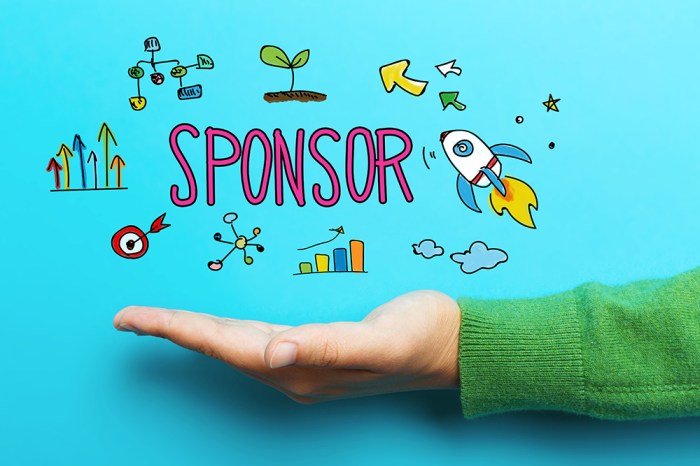Event Sponsorship Tips: Maximizing Benefits and Deals kicks off with an insightful look at the world of event sponsorship, offering valuable insights for businesses and organizers alike.
From finding the right sponsor to crafting compelling proposals and negotiating deals, this guide covers it all with expert tips and real-world examples.
Overview of Event Sponsorship Tips
Event sponsorship is a mutually beneficial partnership between a business and an event organizer, where the business provides financial or in-kind support in exchange for promotional opportunities. This collaboration is crucial for businesses as it helps increase brand visibility, reach target audiences, and create positive brand associations.
Significance of Event Sponsorship
Event sponsorship is crucial for businesses as it offers a unique opportunity to connect with a specific target audience in a more engaging and memorable way compared to traditional advertising. By sponsoring events related to their industry or target market, businesses can increase brand awareness, establish credibility, and differentiate themselves from competitors.
- Increased Brand Visibility: Event sponsorship allows businesses to showcase their brand to a larger audience, leading to increased visibility and brand recognition.
- Targeted Marketing: By sponsoring events relevant to their target market, businesses can directly reach potential customers and create a more personalized connection.
- Positive Brand Associations: Associating with well-executed events can enhance a business’s reputation and create positive brand associations in the minds of consumers.
- Networking Opportunities: Event sponsorship provides businesses with networking opportunities to connect with industry professionals, potential partners, and customers.
- Return on Investment: When done strategically, event sponsorship can yield a high return on investment by generating leads, increasing sales, and enhancing brand loyalty.
Finding the Right Sponsor: Event Sponsorship Tips

Finding the right sponsor for your event is crucial to its success. You want to partner with a company or organization that aligns with your event’s target audience and goals. Here are some strategies to help you identify potential sponsors and ensure a good fit:
Understanding Your Audience and Goals
Before reaching out to potential sponsors, take the time to understand your event’s target audience and goals. What demographics are you trying to reach? What are the key objectives of your event? This information will help you narrow down potential sponsors who can resonate with your audience and support your goals.
Researching Potential Sponsors
Once you have a clear understanding of your audience and goals, start researching potential sponsors. Look for companies or organizations that have a history of sponsoring events similar to yours. Consider their values, brand image, and target market to see if they align with your event.
Aligning Sponsors with Your Event
When approaching sponsors, tailor your pitch to highlight how their brand can benefit from sponsoring your event. Show them how they can reach their target audience through your event and how it aligns with their marketing objectives. Building a strong case for sponsorship will increase the likelihood of securing the right sponsor for your event.
Crafting a Compelling Sponsorship Proposal
Creating a sponsorship proposal that stands out is crucial to attracting potential sponsors. Your proposal should be compelling, clear, and tailored to the needs of the sponsor. Here are some guidelines to help you craft an attractive sponsorship proposal:
Key Elements to Include in a Sponsorship Proposal, Event Sponsorship Tips
When putting together your sponsorship proposal, make sure to include the following key elements:
- Introduction: Start with a brief overview of your event and its target audience.
- Sponsorship Opportunities: Clearly Artikel the different sponsorship levels and benefits.
- Audience Demographics: Provide detailed information about the attendees and their demographics.
- Marketing and Promotion: Explain how the sponsor will be promoted before, during, and after the event.
- ROI: Clearly state the return on investment the sponsor can expect from partnering with your event.
- Social Media Exposure: Detail the social media reach and engagement opportunities for the sponsor.
- Contact Information: Include clear contact details in case the sponsor has any questions or wants to proceed with the partnership.
Examples of Successful Sponsorship Proposals
Here are two successful sponsorship proposals that can serve as inspiration for creating your own:
1. The XYZ Music Festival sponsorship proposal showcased the unique branding opportunities available to sponsors, including exclusive stage naming rights and VIP hospitality packages.
2. The ABC Tech Conference proposal highlighted the high-profile speakers and networking events to attract sponsors looking to reach a tech-savvy audience.
Negotiating Sponsorship Deals
In the world of event sponsorship, negotiating deals is key to securing the support your event needs. Here are some tips to help you navigate the negotiation process effectively and come out with a win-win agreement.
Showcasing the Value of the Event
When negotiating sponsorship deals, it’s crucial to showcase the value of your event to potential sponsors. Highlight key demographics of your audience, the reach of your event (both in-person and online), and the unique opportunities for brand exposure that your event offers. By demonstrating the value that sponsors can gain from partnering with you, you increase your chances of securing a deal.
- Provide data on past event attendance and engagement metrics to give sponsors a clear picture of the potential reach of their brand.
- Highlight any special features or unique selling points of your event that set it apart from others in the industry.
- Offer different sponsorship packages that cater to a variety of budgets and objectives, allowing sponsors to choose the option that best aligns with their goals.
Strategies for Mutually Beneficial Agreements
Creating mutually beneficial agreements is essential for establishing long-lasting relationships with sponsors. Here are some strategies to ensure that both parties benefit from the sponsorship deal.
- Collaborate with sponsors to create customized activation opportunities that align with their marketing objectives and resonate with your audience.
- Offer exclusivity to sponsors in their industry category to maximize their visibility and prevent competitors from overshadowing their presence at the event.
- Provide post-event reports and analytics to sponsors, showcasing the impact of their sponsorship and the return on investment they received.
Activating Sponsorship Benefits

When it comes to maximizing sponsor benefits for your event, you want to make sure you are providing value to your sponsors before, during, and after the event. This not only helps strengthen the relationship with your sponsors but also ensures a successful partnership.
Leverage Social Media Platforms
Utilize social media platforms to promote your sponsors before the event by creating engaging posts highlighting their involvement. During the event, encourage attendees to interact with sponsors on social media by using event-specific hashtags and tagging sponsors in their posts. After the event, share post-event highlights and thank sponsors for their support on social media to further promote their involvement.
Offer Exclusive Opportunities
Provide sponsors with exclusive opportunities to engage with attendees before, during, and after the event. This could include hosting VIP meet-and-greet sessions, sponsoring exclusive giveaways, or organizing post-event networking events. By offering unique experiences, sponsors will see the value in their partnership with your event.
Provide Detailed Reports
After the event, make sure to provide sponsors with detailed reports showcasing the impact of their sponsorship. Include metrics such as brand visibility, engagement levels, and ROI to demonstrate the value they received from sponsoring your event. This not only shows accountability but also helps in securing future sponsorships.
